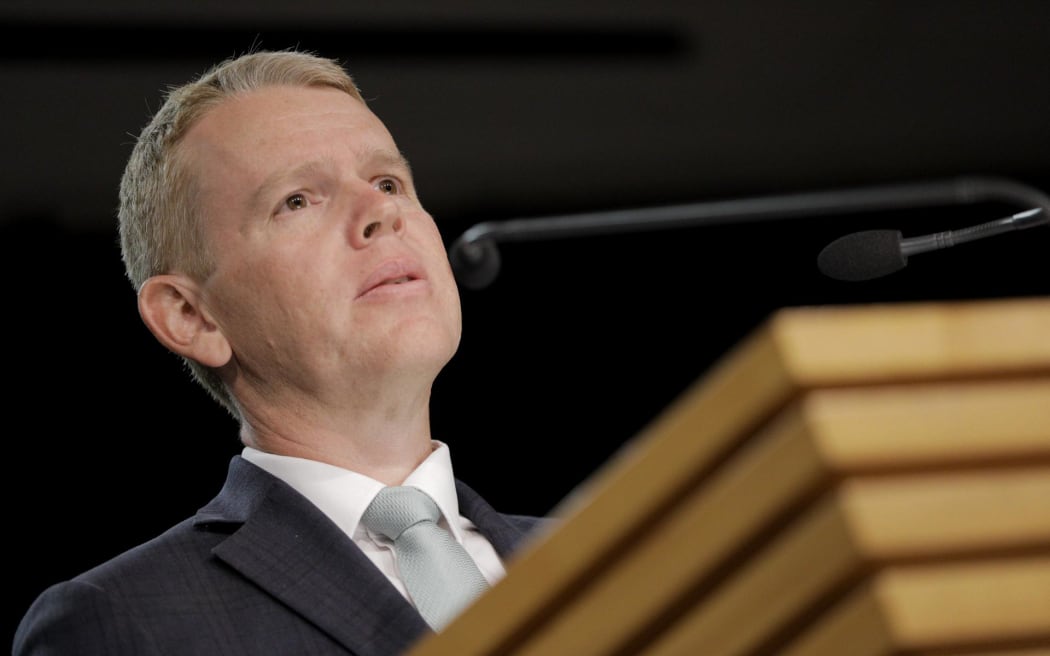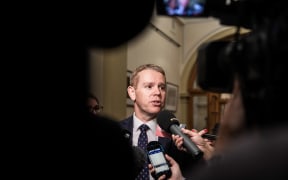
Prime Minister Chris Hipkins wants advice on how to regulate lobbying long-term to report back next year. Photo: RNZ / Angus Dreaver
The government's proposed crackdown on lobbyists has been dismissed as too tentative, and just about meaningless.
Following RNZ's investigation into political lobbying the Prime Minister Chris Hipkins has commissioned long-term work on regulating the industry - but in the meantime, wanted lobbyists to develop their own code of conduct, and is removing their swipe card access to Parliament.
Hipkins said while there may not be a problem with lobbying in New Zealand, there was the perception of a problem.
"New Zealand has a very good reputation internationally as a transparent and a corruption free, or relatively corruption free, country, but that doesn't mean we can be complacent about it," he said.
"Perception is incredibly important here, and so making sure that in addition to our actual practice, being democratic and transparent, that actually perceptions reinforce that as well."
Hipkins wants advice on how to regulate lobbying long-term to report back next year.
In the short-term, he has started by asking the Speaker to revoke lobbyists' swipe card access to Parliament.
Read more about RNZ's investigation into the lobby industry
- The unseen, unchecked industry in lobbying the powerful
- How lobbyists throw their weight around for corporate clients
- 'Why are we hiding?' - Lobbyist's letter to colleagues calling for change
Around 80 lobbyists - including people in unions, business, and the non-government sector - are currently on Parliament's approved list.
But lobbyist Mark Unsworth, of the firm Saunders Unsworth, said removing that access was "just about meaningless".
Unsworth said if lobbyists were meeting with ministers, they were usually greeted at reception, rather than just walking straight into their offices. Swipe cards only allow lobbyists to bypass security.
"The only difference is whether you screen your cellphone, or whatever you've got, through the machine. The other thing [swipe card access] you just go the other way and that's it."
And that cellphone will still contain the same phone numbers, and those lobbyists will have the same relationships, that they have always had.
Hipkins' attention to the issue was first raised following an investigation by RNZ two weeks ago.
But the issue was last looked at in 2012, after former Green Party MP Holly Walker introduced a member's bill. It did not make it past the select committee stage.
Current Green MP Golriz Ghahraman said she was pleased the government acknowledged that political access is unequal in New Zealand.
"The limitations that have been announced do seem very, very minor to address what we know is the problem."
But she said successive governments had the chance to do something about it.
"It shouldn't be up to media to bring these things to light. The government should be actively looking to solving these problems we know exist."
Third-party lobbyists will also be asked to develop a code of conduct.
But while the Ministry of Justice will provide assistance, the code will be voluntary.
National supported the step, but deputy leader Nicola Willis called them "tentative."
"We'd like to see something a bit harder in place. It seems to us that a voluntary code might not quite deliver what's needed here."
Willis also wanted to see a compulsory 12-month standown period for former ministers before they could enter lobbying, and more transparency so the public can see who is lobbying for whom.
Mark Unsworth said he was in favour of more transparency, and a code of conduct. But the last attempt to regulate lobbying failed because it was too broad, he said.
He said this time, the definition of who was a lobbyist would need to be cleared up.
"My best guess is that consultants and lobbyists make up about no more than 20 [percent], probably less, of the lobbying that gets done in New Zealand. The rest just gets done by ordinary people, companies, law firms, accounting firms, plumbers, fisherman and teachers.
"Everybody who has an issue, and every industry association that represents them, and there's hundreds of them."
ACT Party leader David Seymour also supported the removal of swipe cards. But he said those lobbyists who already had significant access and influence would simply continue as normal.
"If you make it more bureaucratic and more difficult to be involved in lobbying, then those who are insiders and able to navigate that complexity will actually have a greater advantage over the average person that just wants to interact with their minister. That would be totally counter-intuitive to what we're trying to achieve here."
As the advice is not set to come back until next year, any long-term regulation would likely require cross-party support.
It is clear other parties will have plenty to say.





